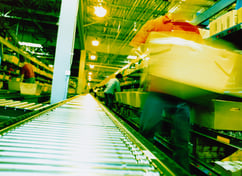3D printing is likely to have an impact on the production methods of many products, their parts, or the raw materials needed in their manufacturing process. 3D printing technology eliminates the mold manufacturing method in favor of a less expensive digital process. The product can be made locally, thereby reducing the distance required to ship the finished goods to market. Material with high shipping costs made of most any plastics based material would be a perfect candidate for 3D printing technology today but a myriad of additional raw materials have been used successfully in 3D printing manufacturing.
Checkout this Youtube video of the top ten 3D projects in the world:
What is 3d Printing?
3D printing is a process of making three-dimensional solid objects from a digital file. The creation of a 3D printed object is achieved using "additive processes". The additive process is a process whereby an object is created by laying down, or adding successive layers of material until the entire object is created. Each of these layers can be seen as a thinly sliced horizontal cross-section of the eventual object.
How Does 3D Printing Work?
It all starts with making a virtual design of the object you want to create. This virtual design is made in a Computer Aided Design file using a 3D modeling program to create a new design. A 3D scanner can also make a 3D digital copy of an existing object. Recently, many IT companies like Microsoft and Google enabled their hardware to perform 3d scanning. This is a clear sign that future hand-held devices like smartphone will be equipped with integrated 3d scanners. Digitizing real objects into 3d models will become as easy as taking a picture.
Industrial Applications
Rapid Prototyping and Rapid Manufacturing are two currently used applications. Industrial, high-speed 3D printers can cost tens of thousands of dollars but be very cost effective in the prototyping process. Nike uses 3D printers to create multi-colored prototypes of their shoes. They used to spend thousands of dollars on a prototype and wait weeks for it. Now, the cost is only a few hundred dollars and changes can be made easily on the computer and the prototype reprinted the same day. 3D printing is also used for Rapid Manufacturing. Rapid manufacturing is a new method of manufacturing where companies are using high speed 3D printers for short run custom manufacturing of a finished product. Currently most products eligible for 3D printing must be made of some sort of polymer for mass production but individual projects can consist of many different raw materials.
How all This May Affect Shipping and the Transportation Industry
 The manufacturing applications of 3D printing may replace the mold form of manufacture and eliminate the need to import plastic based goods from half way around the world. For now the process may be best suited for small run custom manufacturing but there are many more interesting applications in this same vein. The US Army prints out surgical instruments and protective masks directly in war zones. NASA is also experimenting with the possibilities offered by 3D printing for deployment in outer space, which may enable astronauts to print their own tools and replacement parts. Additional areas using 3D printing technology are Education, Consumer Electronic, Automotive and Architectural.
The manufacturing applications of 3D printing may replace the mold form of manufacture and eliminate the need to import plastic based goods from half way around the world. For now the process may be best suited for small run custom manufacturing but there are many more interesting applications in this same vein. The US Army prints out surgical instruments and protective masks directly in war zones. NASA is also experimenting with the possibilities offered by 3D printing for deployment in outer space, which may enable astronauts to print their own tools and replacement parts. Additional areas using 3D printing technology are Education, Consumer Electronic, Automotive and Architectural.
So, it is not yet possible to predict if and to what extent the advance of 3D print technology will affect global transport volumes. Routes are likely to shift, with fewer finished products shipped from far away. Meanwhile, local production sites close to consumer markets will be in increased demand. Initially, this would mean a decrease in long-distance shipping and an increase in "last mile" shipping. The impact of the 3D printing application is likely several years away but it appears to be a process that has a significant future in specific manufacturing sectors.



 Land-Link, a well respected professional organization, has been providing its clients with effective transportation and logistics solutions since 1978.
Land-Link, a well respected professional organization, has been providing its clients with effective transportation and logistics solutions since 1978.

